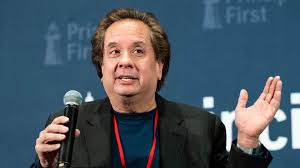Blog
Trending
George Conway: A Legal Maverick in the Political Arena
George Conway: A Legal Maverick in the Political Arena
INTRODUCTION
George Conway is a name that has become synonymous with a unique blend of legal acumen and political commentary. A highly respected lawyer, Conway has made headlines not only for his legal work but also for his outspoken criticism of former President Donald Trump—a stance that has put him at odds with his wife, Kellyanne Conway, a key figure in Trump’s administration. This article delves into George Conway’s life, career, and his unexpected role as a vocal critic of the Trump presidency, exploring how his legal background has shaped his views and influenced the broader political discourse.
1. Early Life and Education
- Background and Upbringing: George Conway was born on September 2, 1963, in Boston, Massachusetts. Raised in an academically inclined family, Conway showed an early aptitude for law and debate. His father, an electrical engineer, and his mother, an organic chemist from the Philippines, instilled in him a strong work ethic and a respect for intellectual rigor.
- Education: Conway attended Marlborough High School, where he was an outstanding student. His academic achievements earned him a place at Harvard College, where he graduated magna cum laude with a degree in biochemistry in 1984. Conway’s interest in law grew during his time at Harvard, prompting him to attend Yale Law School. At Yale, he was an editor of the prestigious Yale Law Journal and graduated with a Juris Doctor degree in 1987.
2. Legal Career: Building a Reputation
- Early Legal Work: After law school, Conway began his legal career by clerking for Judge Ralph K. Winter Jr. of the U.S. Court of Appeals for the Second Circuit. This experience provided him with a solid foundation in appellate law and a deep understanding of the judiciary’s inner workings.
- Wachtell, Lipton, Rosen & Katz: In 1988, Conway joined the esteemed New York law firm Wachtell, Lipton, Rosen & Katz, where he would spend the next three decades. Specializing in litigation, Conway quickly made a name for himself as a brilliant and meticulous lawyer. His work primarily involved corporate litigation, where he handled complex cases related to mergers and acquisitions, securities law, and antitrust issues.
- Key Legal Cases: Conway’s reputation in the legal community was cemented by his involvement in several high-profile cases. One of his most notable cases was Morrison v. National Australia Bank, a landmark Supreme Court case in 2010 that limited the extraterritorial application of U.S. securities laws. Conway’s work on this case demonstrated his deep understanding of both corporate law and the broader implications of legal precedents.
3. The Unexpected Political Voice
- Entry into Politics: Despite his successful legal career, Conway largely stayed out of the public eye until 2016, when his wife, Kellyanne Conway, became a prominent figure in Donald Trump’s presidential campaign. Initially, George Conway supported Trump’s candidacy, even being considered for a position in the Trump administration as the head of the Civil Division in the Department of Justice. However, he eventually declined the offer, citing the need to focus on his legal career.
- A Shift in Perspective: As Trump’s presidency unfolded, Conway’s views began to shift. Disturbed by Trump’s behavior and actions in office, Conway became increasingly vocal in his criticism. His legal background gave him a unique perspective on the constitutional and ethical concerns surrounding Trump’s administration. This led him to take to Twitter and other platforms to express his dissent, often citing legal arguments and historical precedents.
- Public Feud with Trump: Conway’s criticism of Trump was not limited to social media. He penned several op-eds for major newspapers, including The New York Times and The Washington Post, where he articulated his concerns about Trump’s fitness for office. Conway’s critiques were sharp and legally grounded, often focusing on what he perceived as Trump’s disregard for the rule of law.
4. The Lincoln Project: A New Platform for Opposition
- Founding The Lincoln Project: In late 2019, Conway co-founded The Lincoln Project, a political action committee (PAC) aimed at defeating Donald Trump and his allies in the 2020 election. The group, comprised mainly of disillusioned Republicans and conservatives, sought to hold Trump accountable through aggressive ad campaigns and strategic political messaging.
- Role and Influence: Within The Lincoln Project, Conway played a significant role in shaping the group’s legal and ethical arguments against Trump. The PAC’s ads often targeted Trump’s character and actions, using Conway’s legal insights to craft messages that resonated with both moderate Republicans and independents.
- Impact on the 2020 Election: The Lincoln Project gained considerable attention for its hard-hitting ads and its ability to provoke Trump. While the true impact of the group on the election results is debated, there is no doubt that The Lincoln Project became a thorn in Trump’s side, amplifying Conway’s criticisms on a national scale.
5. Personal and Professional Challenges
- Marriage and Public Scrutiny: One of the most discussed aspects of George Conway’s public life is his marriage to Kellyanne Conway. The stark contrast between his anti-Trump stance and her role as a senior advisor to Trump led to intense media scrutiny. Their marriage became a symbol of the deep political divisions within the country, with many speculating on how they navigated such opposing views within their household.
- Family Dynamics: The Conway’s personal lives were thrust into the spotlight, especially as their teenage daughter, Claudia Conway, began publicly criticizing Trump and expressing her support for her father’s views. This added another layer of complexity to the public’s perception of the Conway family, highlighting the personal toll of their political differences.
- Stepping Back from The Lincoln Project: In August 2020, George Conway announced that he would be stepping back from The Lincoln Project and taking a break from Twitter to focus on his family. This decision came amidst increasing media attention on the Conway family’s internal dynamics, particularly concerning their daughter’s social media activity.
6. Legal Legacy and Continuing Influence
- Continued Legal Work: Despite his foray into the political arena, George Conway has continued to maintain his legal career. He remains respected within the legal community for his sharp mind and deep understanding of constitutional law. His opinions, often published in legal journals and op-eds, continue to influence discussions around the rule of law and the judiciary.
- Influence on Legal and Political Discourse: Conway’s legal critiques of Trump have left a lasting impact on the broader discourse surrounding presidential power and accountability. His arguments, grounded in constitutional law, have been cited in discussions about the limits of executive authority and the importance of upholding democratic norms.
- Mentorship and Advocacy: Beyond his public and legal work, Conway is known for mentoring younger lawyers and advocating for the integrity of the legal profession. His emphasis on the importance of the rule of law and ethical conduct has made him a respected figure among both established and aspiring lawyers.
7. The Legacy of George Conway
- A Contrarian Voice in Turbulent Times: George Conway’s legacy is one of principled opposition. His willingness to speak out against a president from his own party, based on legal and ethical grounds, sets him apart as a figure of integrity in a time of deep political division. His contributions to The Lincoln Project and his public critiques of Trump have cemented his place as a significant figure in the resistance to Trump-ism within the conservative movement.
- Impact on Public Perception of the Law: By bringing his legal insights into the public arena, Conway has helped elevate the importance of constitutional principles in the public consciousness. His arguments have reminded Americans of the foundational role that the rule of law plays in maintaining democracy.
- A Complicated Legacy: However, Conway’s legacy is not without its complexities. His public feud with Trump and the strain it placed on his family life have led some to question the personal cost of his political activism. Nonetheless, Conway’s commitment to his principles, even in the face of personal and professional challenges, underscores the importance of standing up for what one believes is right.




